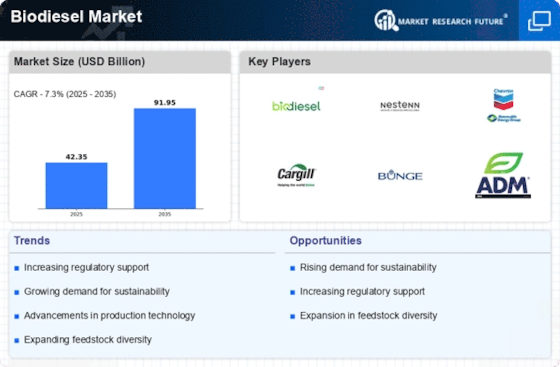Market Share
Biodiesel Market Share Analysis
Market share positioning strategies are critical for players in the biodiesel market as they seek to establish a strong presence, compete effectively, and capitalize on the growing demand for sustainable energy sources. One prominent strategy is differentiation through feedstock selection. Biodiesel producers strategically choose their feedstock sources to distinguish themselves in the market. This can involve opting for advanced feedstocks such as algae or using waste products like used cooking oil. By selecting unique and sustainable feedstocks, companies can carve out a niche and attract environmentally conscious consumers and businesses. Government rules and policies are crucial in determining the biodiesel industry. Policies encouraging the use of biofuels, such as biodiesel, are being implemented in many nations as part of larger plans to lower carbon emissions and improve energy security. Governments use a variety of policy instruments to promote the production and use of biodiesel, including tax breaks, subsidies, and mandates for biofuel. Market dynamics are greatly impacted by the regulatory environment, which also affects production levels, investment choices, and biodiesel's overall competitiveness in the energy sector. Another key positioning strategy is geographic diversification. Biodiesel producers strategically expand their operations into different regions, taking advantage of varying market conditions and local preferences. This approach not only mitigates risks associated with regional economic fluctuations or regulatory changes but also allows companies to tap into diverse feedstock sources. Geographic diversification enables market players to adapt to evolving market demands and ensures a more resilient market position. Strategic partnerships and collaborations are essential components of market share positioning in the biodiesel industry. By forming alliances with feedstock suppliers, technology providers, and distributors, companies can strengthen their supply chains, access new markets, and benefit from shared resources and expertise. Collaborations can also facilitate research and development efforts, driving innovation in biodiesel production processes and enhancing overall competitiveness.


















Leave a Comment